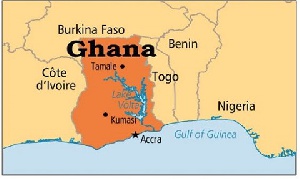“A people without the knowledge of their past history, origin and culture is like tree without roots” - Marcus Garvey
The exploits of the medieval West African Ghana Empire which existed between 4th-13th centuries inspired the founders of the Republic of Ghana to name our motherland after this great empire. Captured in Nkrumah’s speech “long before England had assumed any importance, long before her people united into a nation; our ancestors had attained a great empire… It is said that lawyers and scholars were much respected … inhabitants of Ghana wore garments of wool, cotton, silk and velvet. Thus may we take pride in the name of Ghana not out of romanticism, but as an inspiration for the future. It is right and proper that we should know about our past. Just as the future moves from the present so the present has emerged from the past”.
It is dangerous when a man doesn’t know where he is coming from, but it is even more fatal when he doesn’t also know where he’s going. History and for that matter cultural heritage was integral in the development itinerary of our new nation. Institutions such as the Ghana Museums and Monuments Board, Centres for National Culture amongst other heritage organizations were setup and resourced to play a dynamic and transformative role in our national development architecture.
Heritage provides the main pillars on which the future is built and therefore without cultural heritage, a nation loses its main source of self-expression and self-realization. Heritage is therefore a key instrument in charting the future of a nation since it provides concrete basis and serves as a reference point for development.
Nkrumah underscored the value of cultural heritage when he said “what our ancestors received in the context of their contemporary society gives us confidence that we can create, out of that past, a glorious future, not in terms of war and military pomp, but in terms of social progress and of peace. Our battles shall be against the old ideas that keep men trammeled in their own greed; against the crass stupidities that breed hatred, fear and inhumanity. The heroes of our future will be those who can lead our people out of the stifling fog of disintegration through serfdom, into the valley of light where purpose, endeavor and determination will create that brotherhood which Christ proclaimed two thousand years ago, and about which so much is said, but so little is done”.
It is therefore, not surprising that we have historic sites or monuments in this country with real stories which have inspired many people to strengthen their convictions and commitment to fight injustice and oppression.
I was enthralled when I heard that both Joy and Citi FM organized heritage programs in 2016 however, my joy gloomed when both programs ended without any input from our heritage institutions. I believe those programs could have afforded us the opportunity to hear from the managers - our heritage institutions and tell the reasons why our heritage sites and museums are presently in a poor state of conservation.
Equally important is the reasons why policy makers have strangled these institutions. What or who exactly is culpable for the continuous diminution of our heritage and it institutions? Sixty years down the lane we still do not have state-of-the-art museums across the country as planned. Yet the few museums and monuments we have are deteriorating across the country. I was left disappointed, more than ever before.
Recently, page 7 of an article published on June 1st, 2017 of Daily Graphic revealed the Ghana Museums and Monuments Board received a negligible sum of GHS 2,000.00 as subvention for a whole year. Isn’t this a clear demonstration of outright despondency and lack of respect to our national identity and self-expression? Even with the incessant calls for a bridge in the huge resource deficit, it is difficult to understand how, the financial requirements of the institution with the mandate to protect the material cultural heritage of a whole country can be treated with such contempt.
We may be successful in undermining the relevance of heritage but we can never escape paying the price for destroying it. The consequences are already with us. Today more than ever before, have we seen citizens with ill responsibility and failed government representatives happening to polarize a nation.
Treachery, selfishness, greed, doctrines of tribal chauvinism, and national hatred are being promulgated and accepted as ethics. Our representatives beg for votes and the voter in return begs them for money; professional jobs are no longer handled by professionals but by ignorant muscle people; leadership is no longer a call to duty but a means of becoming rich overnight; religious bodies have become more worldly while the clergy does more politics than preaching the gospel, and when reality stares us in the face we quote allies without shame to repel whiners. Although, these are clear signs of a nation suffering from Alzheimer’s, we still pretend all is well.
Our past history is the wisdom for future growth in every endeavor as past errors and successes are noted as reference points in evolution. Yet, as a country we commit more mistakes in the same areas than our predecessors did.
Yes, perhaps we have more room for errors and very tiny space for learning and improvement. We can enact all the laws, exploit all our natural resources, build the biggest churches and mosques but then, if we forget to keep alive those cultural values which guide our conscience and unite us as a nation, we will end up living like second-class mammals.
We can take a cue from the story of the Chinese defense wall and perhaps learn from the recent exploits of countries such as Japan, Malaysia, India, South Korea, and China amongst others that have adopted what is called critical cultural renaissance.
Opinions of Sunday, 27 August 2017
Columnist: Francis Kwarayire














